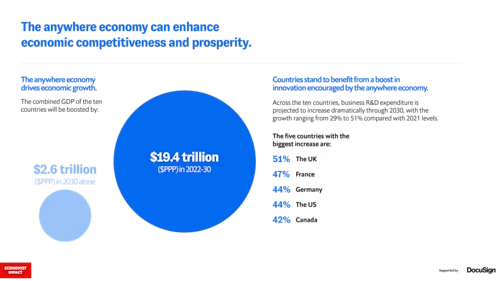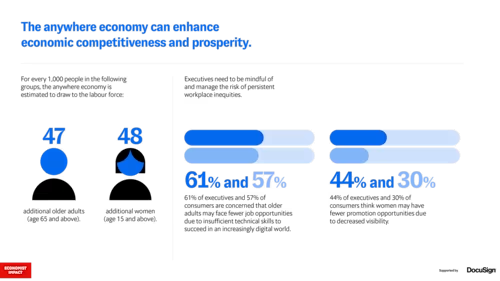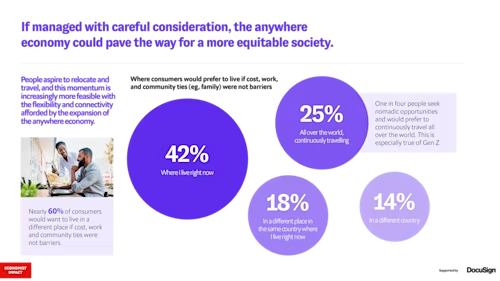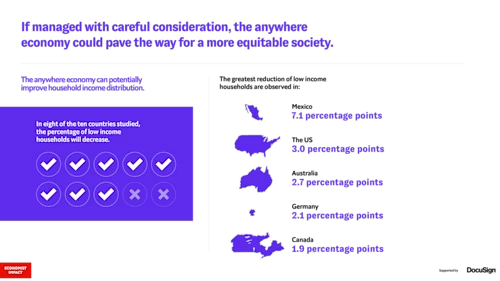
New Research Reveals We’re on the Precipice of the Next Global Productivity Boom
See the findings of a new report that examines how a more distributed and connected world spurs the need for innovative strategies technology.
Table of contents

Docusign today released findings from a new report that examines how a more widely distributed and connected world spurs the need for innovative strategies and deeper investments in technology.
The research shows that executives and consumers are largely optimistic that digital investments made in recent years will create notable opportunities and improve quality of life as the anywhere economy expands. The ability to do business from anywhere at any time has the potential to boost individual productivity significantly and create economic expansion over the coming decade.
Docusign sponsored two global surveys of 2,800 consumers and 764 executives in 10 countries to examine the effects of the anywhere economy on how we live, work and do business. The research, conducted by think tank Economist Impact, also applies econometric models to forecast the potential future impact of the anywhere economy in the countries surveyed: U.S., Australia, Japan, France, Germany, Ireland, the UK, Brazil, Mexico and Canada.
Key takeaways
Results from the survey, conducted during 2022, show that:
Individual productivity will grow an average of 10% across 10 countries studied, adding $19.4 trillion in cumulative GDP by 2030.
Diversity in hiring is improving as two-thirds of executives surveyed believe remote work and digitalisation enable businesses to recruit more widely and create opportunities for more people to join the workforce.
Rural areas are being lifted up as the anywhere economy brings millions of jobs to suburban and rural areas. In 2030 alone, 2.6 million jobs will be created in rural areas, nearly a million of them in the U.S.

The increasingly distributed nature of the world has led to unprecedented investment in digital transformation. This investment, combined with electronic devices, internet connectivity and powerful new digital platforms has transformed society, enabling increased and more impactful connection. These resources have allowed businesses to become decoupled from time and place and have empowered people to shop, socialise, communicate, collaborate and conduct business in ways that were once unimaginable.
Organisations have adapted to meet shifting consumer expectations. Nearly all (90%) of organisations surveyed report they have increased digital communication among colleagues and with customers, and 77% report they are selling more products and services online.
As profound as these changes have been, the full potential of the anywhere economy has not yet been realised. In the coming decade, the anywhere economy will create new economic opportunities, enable millions of people to join the workforce, improve equity and well-being and contribute to a reduction in poverty.
To capture these benefits, organisations must rethink every aspect of how they operate, and dare to experiment with new strategies and initiatives. Leaders must develop a deeper understanding of the complex effects and underpinnings of the anywhere economy—and devote resources to creating new products, entering new markets and doing more cross-border business.
To realize the extraordinary surge in productivity and expansion of the global economy that's possible over the coming decade, leaders will need to embark on a new journey that’s rooted in innovation, transformation, and ultimately trust in our digital future.
Allan ThygesenCEO, DocuSign
The anywhere economy will spark economic growth by boosting productivity and enabling businesses to enter new markets
More than three-quarters of surveyed executives agree that the flexibility to work at any time and from any location has already increased productivity—and productivity growth is projected to continue across the 10 countries studied.
Notably, the countries that are projected to realise the greatest productivity gains are also the countries that are most aggressively boosting investments in research and development.
On average, businesses across all 10 countries will ramp up R&D spending to 1.3 to 1.5 times its 2021 level by 2030. But the biggest spending increases will take place in the UK (51%), France (47%), Germany (44%), the US (44%) and Canada (42%).
Similarly, on average, individual productivity is forecast to increase by 9.7% across the 10 countries, but the biggest gains will be realised in the UK (12%), Canada (11%) Germany (11%), France (10%) and the US (10%).
The results suggest that greater investment is required in order to reap the benefits of the anywhere economy. Businesses that innovate, experiment and invest are more likely to identify and capture new opportunities, and gain a competitive advantage on their competitors.
Leaders should be aggressively seeking new ways to gain efficiencies and optimise internal operations while also focusing externally on opportunities to develop new products and services. New products may complement or enhance existing products, but they might also involve creating entirely different lines of business. Leaders should also be looking to enter new markets and expand geographically, as 70% of executives agreed that the ability to connect to global buyers and sellers online has enabled more cross-border business.
Leaders also should recognise that the corporation itself is changing and consider that in order to remain competitive, organisational structures that have served them well over past decades likely need to be reinvented. New companies will not use traditional organisational structures. They will embrace flexible work styles and distributed business models from the start, enabling them to operate with greater speed and agility. To keep up, incumbents must adapt and evolve.
In theory, the economy is at our fingertips. There is a natural tendency toward economies of scale, as new digital products are being created.
Dr. Javier LopezSenior Trade Policy Analyst, OECD
Employers cast a wider net, creating more diverse and equitable opportunities
The rise of remote and hybrid work is enabling organisations to recruit candidates from a wider geographic range. It is also introducing greater opportunities for women, working parents, older workers and people with disabilities. A better work experience, reduces absenteeism and reduces staff turnover by encouraging those employees to stay engaged in the workforce for longer.

Four out of five surveyed executives say the anywhere economy has enabled them to hire from a wider pool of candidates. The majority say that remote work and flexible work schedules are making their workforce more diverse and equitable, while more than 60% said they have hired workers in new locations because of the possibility of remote working.
Two groups most poised to benefit are women and older workers, whose participation in the workforce will increase significantly by 2030. In fact, the anywhere economy will bring an additional 25 million women into the labor force in the ten studied countries in 2030 alone.
Jobs are moving to rural areas, bringing prosperity to more people and lifting up regional economies
After shifting to work-from-home during the pandemic, many workers migrated from urban centres to smaller cities and towns where they could lower their housing costs while maintaining or even improving their access to education, recreation and other services.
The restlessness has not subsided. Nearly 60% of consumers surveyed say that if cost, work and community were not barriers, they would prefer to live in a different place. Of those, 18% said they would like to live somewhere else in the same country, while 14% would like to move internationally and 25% would like to become digital nomads, continuously traveling all around the world.
That migration is bringing millions of new jobs to rural areas. Across all 10 countries, roughly 2.6 million jobs will be created in rural areas in 2030 alone. Nearly a million of those jobs—860,000—will be created in the U.S.
Adapting to employee wishes, 17% of companies report they have moved their offices from a large city to the suburbs, with one-third opening more satellite offices. A quarter of companies say they have shrunk the size of their premises.

The new economy holds forth the possibility of raising living standards for millions of people, as widening economic opportunity reduces poverty. Eight of the 10 countries in the study are projected to see a decrease in the percentage of low-income households by 2030. Two-thirds of executives expect the changing way of doing business will be “a great social equaliser,” and help emerging economies gain greater access to global markets.
There is a risk, however, that the anywhere economy might widen the digital divide as wealthier countries are able to create value at a higher rate, and less developed countries with poorer access to technology fall further behind. Digital technologies create a “multiplier effect” and amplify income inequalities, says Dr. Soumitra Dutta, dean of the Said Business School at Oxford University.
It’s crucial that countries begin investing in strengthening digital infrastructure, providing internet access to more people: 34% of executives said increased state support could enable more citizens to benefit from the opportunities created by the anywhere economy. Building digital literacy skills will enable low-income and remote populations to take advantage of remote jobs, which are primarily digital.

We can capture the benefits of the coming productivity boom by investing in innovation and establishing new levels of trust
The research shows that trust is essential in a world where we work and do business with people we’ve never met, who might live halfway around the world. Operating an organisation in which employees work remotely and are never supervised directly requires a certain level of trust. The same is true of buying a product you’ve never seen, and conducting transactions digitally, without the involvement of a human salesperson.
The trust that will be required is rooted not only in being able to protect against bad actors, but also being a reliable, dependable partner that can deliver products and services quickly.
Of the executives surveyed, approximately two-thirds said the anywhere economy has positively impacted their organisation’s ability to develop trust in business relations, while boosting their reputation and trust of their customers. Of consumers surveyed, 44% say the anywhere economy has increased their trust in information, and 42% say they have gained more trust for companies.
Consumers and executives expressed concern about micro-crimes like identity theft and macro-attacks like ransomware. Nearly half of consumers and executives agreed that the most important area for attention and investment is cybersecurity technology including digital identity verification. A secure digital foundation removes friction and accelerates business. Deepening trust in digital systems, between employers and employees and between consumers and the companies they patronise, will be critical for the expansion and success of the anywhere economy.
The anywhere economy brings enormous potential to make our lives better by:
increasing worker productivity
creating greater economic opportunities for more people in more places
improving diversity and inclusion
helping reduce the number of low-income households
What can leaders do?
In the coming decade, businesses will gain opportunities to grow by creating new products, entering new markets and doing business more widely across geographic borders.
But leaders must understand the current constraints and risks—in addition to the advantages—of the anywhere economy. Almost half the world’s eight billion people remain offline and cannot access the anywhere economy.
It’s important to bear in mind that this report demonstrates a strong correlation between R&D investment and economic growth. At the national level, policymakers should introduce initiatives to provide high-speed access to more citizens and invest in developing digital literacy skills.
At the organisational level, leaders can help close the distribution gap by continuing to invest in digital technologies that facilitate remote work and enhance collaboration. They should take advantage of the ability to cast a wider net while recruiting and prioritise inclusion when hiring.
Perhaps most importantly, organisations should embrace transparency and recognise that trust is the bedrock of success in the anywhere economy. Leaders should make trust a priority across all aspects of their operation: with business partners, customers, and between employers and employees. This not only entails investing in cybersecurity technology, but also communicating well and building strong relationships.
We are embarking on an exciting era in which new technologies will generate robust economic growth while lifting up millions of people and improving their quality of life. Businesses continue to face the challenge of reinventing the way they operate, but by doing so they can capture the benefits and opportunities to grow, expand and thrive in a rapidly changing world.
The complete findings can be found in the full “Unlocking the potential of the anywhere economy” report.

Docusign IAM is the agreement platform your business needs


